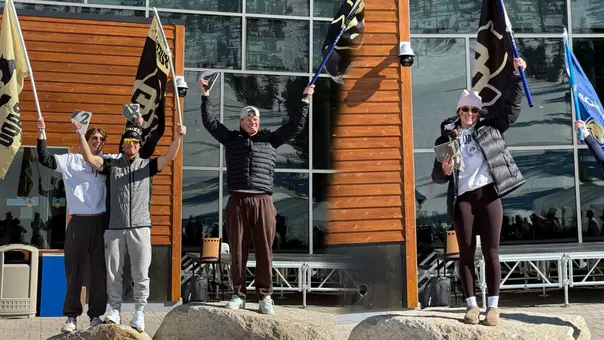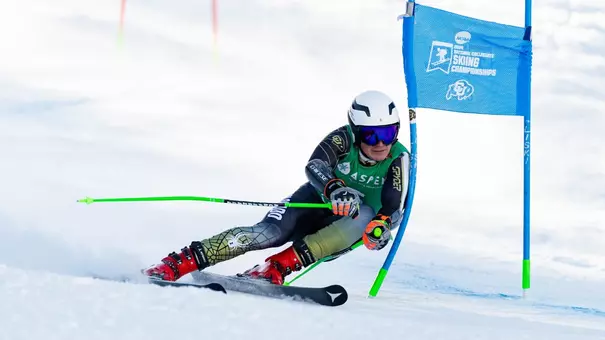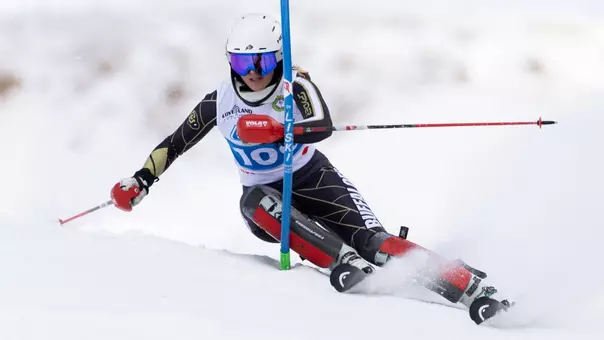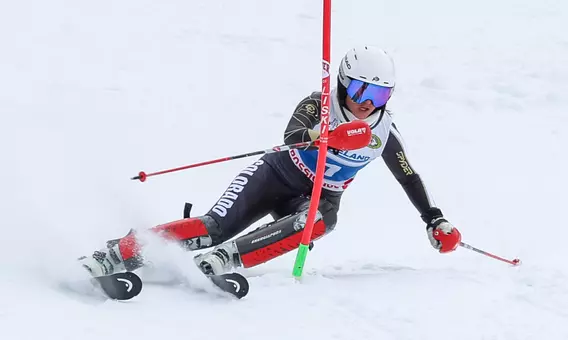Colorado University Athletics
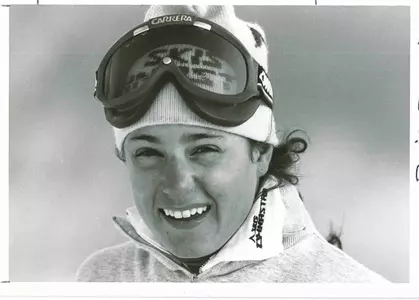
Photo by: CUBuffs.com
SKI BALL '25: Homecoming For Juli Furtado
October 10, 2025 | General, Skiing
Juliana Furtado: What it feels like to be an Olympian icon in the wrong sport?
BOULDER – Juliana Furtado followed the famous Horace Greeley's advice of, "Go west, young man, go west." Except that she was a female.
Born in New York City, she fell in love with skiing at an early age and graduated from the Stratton Mountain Academy in 1985. Most of its top skiers would stay in New England, attending NCAA eastern powers like the University of Vermont, Dartmouth, Middlebury or the University of New Hampshire. But Furtado was among the best and joined the U.S. Ski team as a 15-year old freshman at Stratton.
She spent nearly five years on the U.S. team, and had several impressive finishes on the international stage, including a runner-up finish in the 1984 Europa Cup women's slalom, as well as taking 21st place in the 1982 World Cup. By the time she turned 19, she had battled a few knee injuries and turned her attention to college. But not in the east; she accepted a scholarship offer from University of Colorado coaches Alan Ashley and Frank Kelble and joined the Buffaloes in 1987.
She wanted to make an impact in American collegiate skiing. Safe to say she did from the get-go, earning first-team All-American honors as a freshman with a fourth place finish in the slalom at the '87 NCAA Championships. She had six top 10 finishes in all and was the RMISA champion in the slalom. She had five top 10 efforts the following year as a sophomore, including two giant slalom wins, but the injuries kept mounting.
Due to those injuries, she had to forego her last two years of college eligibility, as well as her pursuit of a professional skiing career. So she set out to follow the business and marketing aspects of the sport instead. She graduated from CU with a degree from CU's prestigious Leeds School of Business.
Always the competitor, she turned to another sport that utilized the Colorado high country – mountain biking. The sport was in its infancy of becoming popular, and in the late 80's, the "cult" thing to do was to attack the cool yet challenging trails specifically for mountain bikes in Moab, Utah. Never losing her competitive nature, she worked hard, started competing in regional races and eventually qualified in the sport for the '96 Summer Olympics in Atlanta, the first games that recognized mountain biking under the cycling umbrella. Furtado finished 10th in the women's cross country event – but was the first American (the top U.S. male team member placed 19th in their event).
"These feelings evolved over time," she recalled. "When I first started bike racing, I was still studying at CU and had just quit the ski racing team. I was raw from the dissolution of my ski dreams and bike racing was a welcome outlet to forget about skiing. After winning the mountain bike Worlds, I was really appreciative of starting a cycling career. I was graduating from the Business School and not ready to enter normal life.
"After excelling quickly and experiencing success at a very young age in skiing, it didn't seem unusual for me to have the same trajectory in cycling. However, my sudden rise and surprising dominance was a little bit of a shock to everyone else, and I think that's when my feelings began to change. Suddenly, I was thrust into an almost larger than life stature and representative in a sport I had just begun. Internally, I knew cycling was my venue to achieve the success I wanted in skiing, but I kept that to myself. At times, I even felt like an imposter and guilty that I didn't share the same passion and enthusiasm for bike racing as everyone else in the sport. In fact, my close friends in cycling wondered if I would even mountain bike at all after I retired! That's an exaggeration, of course, and was said humorously to tease my lackluster attitude to a sport that they loved to their core."
In September 1993, after mountain biking was announced as an Olympic sport to be added in the '96 games, she felt like everything changed overnight for her.
"As the favorite, I was suddenly in the mainstream media," she said. "At that point, I'd been anointed the 'queen' and felt a huge responsibility to represent both mountain biking and female athletes in the best light possible. For me, it was a huge honor and I took pride in being a role model. At the same time, I was feeling a huge disconnect between the portrait of me as a cycling icon and Olympic favorite with my wish to still be a ski racer and competing in the winter Olympics."
Most had forgotten she was a top competitive skier for almost 20 years of her life. Now living in northern California, she began to utilize her business degree from CU. She was the founder of the Juliana Brand and the CEO of the International Women of Mystery, Inc. (Furtado said to define that, "It just remains a mystery").
The Juliana brand was a serious venture for her. Founded in 1998 after he retired, at that time, no women's specific sporting product existed, let alone an entire market. Cycling was extremely male dominated at the high executive level and trying to change an industry's male business mindset was very difficult.
"I always enjoyed thinking outside the box and strongly believed there was an opportunity to create a bike market that addressed both the need of a bike product that was specific to the different physical types of women versus. men," Furtado said. "Plus creating a women's communal space in the industry that empowered women to fulfill their personal goals. Almost 30 years later, the Juliana brand remains strong." She is planning an expansion into other sports, a business development she has long been strategizing.
"After I retired, I knew I couldn't remain involved at any level in bike racing, as the chasm between my image and feelings had grown too wide for me to navigate," she said. "Instead, I founded the Juliana women's line and essentially disappeared from the sport except for brief appearances at Juliana social events. I felt pride for achieving a business goal and it was incredible when women would tell me how a Juliana bike changed their lives and what a role model I was.
"But I need to be honest. At that point, the feeling of being a fraud grew exponentially. I always tried to change the subject when people wanted to talk about cycling or my career, as it was becoming too hard to fake enthusiasm. I refused most interview requests. Over time, as I slowly reverted back to the ski world, I would forget I ever had a cycling career."
But she never forgot that first true love – skiing down a mountain several times faster than she should ever race on a bike. That, along with still having a fond place in her heart for her time in Colorado, particularly Boulder.
"After decades in Cali and never envisioning living here again, an epiphany happened to me," she said. "I was running up Flagstaff the day after taking my son Wyatt to a CU football game last November and showing him Boulder. I thought to myself, 'I should move back to Boulder and work with the athletic department.'"
"So, I left Santa Cruz alone on January 30, 2025, leaving my animals, house, son, etc., etc., and cried the entire way until on the outskirts of Boulder. Crazily, when I was 18, I did the same solo drive from Vermont. I had no destination, all I knew is that I had to leave my home and mom and head west. I ended up in Boulder.
"The crazy move was like a homing pigeon returning home," she said. "In my case, it was returning to my former self, a.k.a., skiing. I guess this a long-winded way to say I'm thrilled to be back in Boulder and reconnecting with the world that resonates the strongest with my soul!
And now she wants to give back to the school, and the sport she earned two varsity letters in over a third of a century ago. Not that she wants to bury her time as a mountain biking enthusiast, but because skiing was, and remains, her first love.
The CU Ski Ball was created as the program's major fundraiser in the 1970's, helping to fund the men's and women's teams in several areas from scholarships to expenses not covered by the university.
In conjunction with this year's event – slated for tonight (Friday, Oct. 10) at Boulder's newest hotel, The Limelight, just across from campus – she has created the "Enjoy A Day of Skiing and Cappucinos with Juliana Furtado, A Proud CU Ski Team Alum." Those interested in spending a day with her in a fun, unique environment can submit bids to do so, with all contributions going directly to the CU ski team.
The bidding will be on-line, with all auction items available to be viewed beginning at Noon (MDT) Friday, Oct. 10; if you are not present at the Ski Ball to collect the certificate, please make arrangements to coordinate in the near future with Kimbirly Orr (alumnicclub@colorado.edu; 303-492-0622). The link to bid: https://skiball.bolder.bid.
Born in New York City, she fell in love with skiing at an early age and graduated from the Stratton Mountain Academy in 1985. Most of its top skiers would stay in New England, attending NCAA eastern powers like the University of Vermont, Dartmouth, Middlebury or the University of New Hampshire. But Furtado was among the best and joined the U.S. Ski team as a 15-year old freshman at Stratton.
She spent nearly five years on the U.S. team, and had several impressive finishes on the international stage, including a runner-up finish in the 1984 Europa Cup women's slalom, as well as taking 21st place in the 1982 World Cup. By the time she turned 19, she had battled a few knee injuries and turned her attention to college. But not in the east; she accepted a scholarship offer from University of Colorado coaches Alan Ashley and Frank Kelble and joined the Buffaloes in 1987.
She wanted to make an impact in American collegiate skiing. Safe to say she did from the get-go, earning first-team All-American honors as a freshman with a fourth place finish in the slalom at the '87 NCAA Championships. She had six top 10 finishes in all and was the RMISA champion in the slalom. She had five top 10 efforts the following year as a sophomore, including two giant slalom wins, but the injuries kept mounting.
Due to those injuries, she had to forego her last two years of college eligibility, as well as her pursuit of a professional skiing career. So she set out to follow the business and marketing aspects of the sport instead. She graduated from CU with a degree from CU's prestigious Leeds School of Business.
Always the competitor, she turned to another sport that utilized the Colorado high country – mountain biking. The sport was in its infancy of becoming popular, and in the late 80's, the "cult" thing to do was to attack the cool yet challenging trails specifically for mountain bikes in Moab, Utah. Never losing her competitive nature, she worked hard, started competing in regional races and eventually qualified in the sport for the '96 Summer Olympics in Atlanta, the first games that recognized mountain biking under the cycling umbrella. Furtado finished 10th in the women's cross country event – but was the first American (the top U.S. male team member placed 19th in their event).
"These feelings evolved over time," she recalled. "When I first started bike racing, I was still studying at CU and had just quit the ski racing team. I was raw from the dissolution of my ski dreams and bike racing was a welcome outlet to forget about skiing. After winning the mountain bike Worlds, I was really appreciative of starting a cycling career. I was graduating from the Business School and not ready to enter normal life.
"After excelling quickly and experiencing success at a very young age in skiing, it didn't seem unusual for me to have the same trajectory in cycling. However, my sudden rise and surprising dominance was a little bit of a shock to everyone else, and I think that's when my feelings began to change. Suddenly, I was thrust into an almost larger than life stature and representative in a sport I had just begun. Internally, I knew cycling was my venue to achieve the success I wanted in skiing, but I kept that to myself. At times, I even felt like an imposter and guilty that I didn't share the same passion and enthusiasm for bike racing as everyone else in the sport. In fact, my close friends in cycling wondered if I would even mountain bike at all after I retired! That's an exaggeration, of course, and was said humorously to tease my lackluster attitude to a sport that they loved to their core."
In September 1993, after mountain biking was announced as an Olympic sport to be added in the '96 games, she felt like everything changed overnight for her.
"As the favorite, I was suddenly in the mainstream media," she said. "At that point, I'd been anointed the 'queen' and felt a huge responsibility to represent both mountain biking and female athletes in the best light possible. For me, it was a huge honor and I took pride in being a role model. At the same time, I was feeling a huge disconnect between the portrait of me as a cycling icon and Olympic favorite with my wish to still be a ski racer and competing in the winter Olympics."
Most had forgotten she was a top competitive skier for almost 20 years of her life. Now living in northern California, she began to utilize her business degree from CU. She was the founder of the Juliana Brand and the CEO of the International Women of Mystery, Inc. (Furtado said to define that, "It just remains a mystery").
The Juliana brand was a serious venture for her. Founded in 1998 after he retired, at that time, no women's specific sporting product existed, let alone an entire market. Cycling was extremely male dominated at the high executive level and trying to change an industry's male business mindset was very difficult.
"I always enjoyed thinking outside the box and strongly believed there was an opportunity to create a bike market that addressed both the need of a bike product that was specific to the different physical types of women versus. men," Furtado said. "Plus creating a women's communal space in the industry that empowered women to fulfill their personal goals. Almost 30 years later, the Juliana brand remains strong." She is planning an expansion into other sports, a business development she has long been strategizing.
"After I retired, I knew I couldn't remain involved at any level in bike racing, as the chasm between my image and feelings had grown too wide for me to navigate," she said. "Instead, I founded the Juliana women's line and essentially disappeared from the sport except for brief appearances at Juliana social events. I felt pride for achieving a business goal and it was incredible when women would tell me how a Juliana bike changed their lives and what a role model I was.
"But I need to be honest. At that point, the feeling of being a fraud grew exponentially. I always tried to change the subject when people wanted to talk about cycling or my career, as it was becoming too hard to fake enthusiasm. I refused most interview requests. Over time, as I slowly reverted back to the ski world, I would forget I ever had a cycling career."
But she never forgot that first true love – skiing down a mountain several times faster than she should ever race on a bike. That, along with still having a fond place in her heart for her time in Colorado, particularly Boulder.
"After decades in Cali and never envisioning living here again, an epiphany happened to me," she said. "I was running up Flagstaff the day after taking my son Wyatt to a CU football game last November and showing him Boulder. I thought to myself, 'I should move back to Boulder and work with the athletic department.'"
"So, I left Santa Cruz alone on January 30, 2025, leaving my animals, house, son, etc., etc., and cried the entire way until on the outskirts of Boulder. Crazily, when I was 18, I did the same solo drive from Vermont. I had no destination, all I knew is that I had to leave my home and mom and head west. I ended up in Boulder.
"The crazy move was like a homing pigeon returning home," she said. "In my case, it was returning to my former self, a.k.a., skiing. I guess this a long-winded way to say I'm thrilled to be back in Boulder and reconnecting with the world that resonates the strongest with my soul!
And now she wants to give back to the school, and the sport she earned two varsity letters in over a third of a century ago. Not that she wants to bury her time as a mountain biking enthusiast, but because skiing was, and remains, her first love.
The CU Ski Ball was created as the program's major fundraiser in the 1970's, helping to fund the men's and women's teams in several areas from scholarships to expenses not covered by the university.
In conjunction with this year's event – slated for tonight (Friday, Oct. 10) at Boulder's newest hotel, The Limelight, just across from campus – she has created the "Enjoy A Day of Skiing and Cappucinos with Juliana Furtado, A Proud CU Ski Team Alum." Those interested in spending a day with her in a fun, unique environment can submit bids to do so, with all contributions going directly to the CU ski team.
The bidding will be on-line, with all auction items available to be viewed beginning at Noon (MDT) Friday, Oct. 10; if you are not present at the Ski Ball to collect the certificate, please make arrangements to coordinate in the near future with Kimbirly Orr (alumnicclub@colorado.edu; 303-492-0622). The link to bid: https://skiball.bolder.bid.
WBB: Colorado vs. KSU Highlights | January 30, 2026
Monday, February 02
HIGHLIGHTS: Colorado Men's Basketball vs. TCU | 2.1.26
Sunday, February 01
WBB: Colorado vs. OSU Highlights | January 25, 2026
Sunday, January 25
HIGHLIGHTS: Colorado Men's Basketball vs. UCF | 1.24.26
Saturday, January 24


